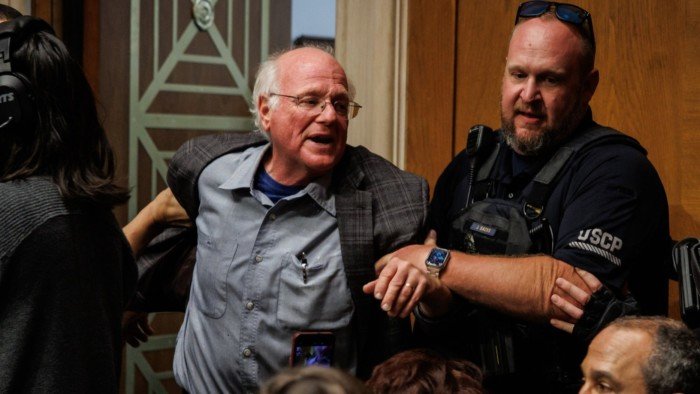Unlock the White House Watch newsletter for free
Your guide to what Trump’s second term means for Washington, business and the world
Ben & Jerry’s co-founder Ben Cohen said corporate America’s retreat from efforts to boost diversity and inclusion amounted to “appeasement”, as the campaigning businessman claimed consumers cared more than ever about corporate “purpose”.
Companies ranging from Goldman Sachs and Citigroup, to Walt Disney and McDonald’s, have scaled back diversity targets or policies under pressure from US President Donald Trump, who is waging war on “illegal and immoral” diversity, equity and inclusion programmes.
Cohen told the Financial Times in an interview that he saw the widespread corporate retreats as “appeasement” that “just encourages bullies”. The White House did not respond to a request for comment.
The Ben & Jerry’s co-founder added that the backtracking was indicative that while companies were notionally doing DEI they “didn’t really believe in it”.
“All these corporations made these statements after the murder of George Floyd,” Cohen said. “[DEI] was just some little bauble that they stuck on because consumers were demanding it.”
Ben & Jerry’s was an early exemplar of values-based capitalism, in which businesses aim to do good as well as make a profit.
That was also the mantra of its parent company, Unilever, for years. But the Anglo-Dutch consumer goods group — which bought Ben & Jerry’s from Cohen and his co-founder, Jerry Greenfield, 25 years ago — has now de-emphasised its sustainability efforts and refocused on shareholder returns.
Cohen and Greenfield said this year they were seeking to buy back Ben & Jerry’s because the brand’s values no longer aligned with those of Unilever. Cohen declined to comment on those plans.
However, Unilever is in the process of spinning off its entire ice cream division — which includes Ben & Jerry’s as well as Magnum and Wall’s — into a separate listed entity.
Relations between Ben & Jerry’s and its parent have been strained for years. The ice cream brand is suing Unilever for allegedly attempting to silence its activism on Gaza. Last week, the brand called Israel’s actions in Gaza genocide.
Cohen, who launched Ben & Jerry’s with Greenfield in Vermont in 1978, said the rise in consumer boycotts of brands in recent years reflected how “fed up” people were.
Russia’s full-scale invasion of Ukraine and Israel’s bombing of Gaza prompted shoppers to shun companies they believed to be complicit in the conflicts.
Meanwhile, Trump’s tariffs and aggressive approach to foreign policy have led to boycotts of American-made goods in countries including Canada and Denmark this year.
Cohen was arrested last month after disrupting a US Senate hearing featuring health secretary Robert F Kennedy Jr, in protest against the humanitarian crisis in Gaza and cuts to medical aid programmes in the US.
The activist said that while he disagreed with a lot of Kennedy’s policy ideas — including cutting funding to health programmes — he agreed with his efforts to remove harmful chemicals from food and enhance regulation of the industry.
“I do believe that our whole food system has been taken over by corporate interests,” Cohen said, adding that he strongly believed the Food and Drug Administration and the US Department of Agriculture had “allowed food additives and chemicals into our food supply that are harmful to the population”.
By way of example, Cohen recounted when he and Greenfield wanted to inform consumers they had stopped using milk from cows that were treated with bovine growth hormones. The FDA, Cohen said, told them it was illegal to do so.
“We ended up having to sue the federal government to be able to say what’s not in our ice cream,” he said.

